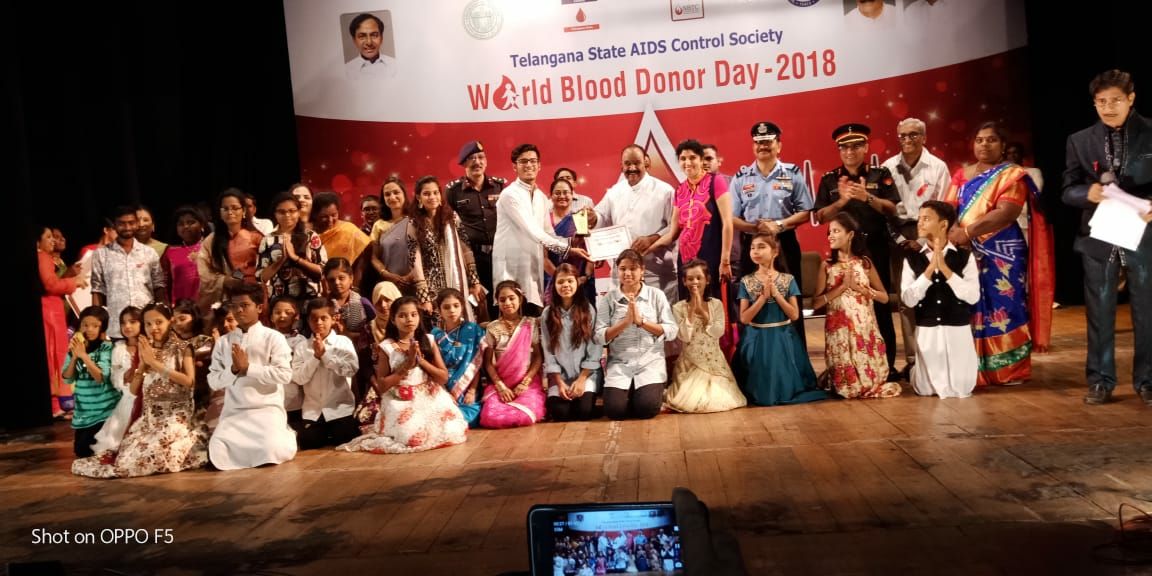Thalassemia and Sickle Cell Society
ABOUT ORGANIZATION
Thalassemia and Sickle Cell Society, a voluntary organisation established in 1998, is the only place in the state of Telangana & Andhra Pradesh wherein a Transfusion Centre with attached Blood Bank is managing the treatment of blood disorders - Thalassemia & Sickle Cell anemia in Hyderabad. Our objective is to increase the life expectancy and enhance the quality of lives of all Thalassemic patients. At present more than 2578 patients, are being served under one roof, a unique, and unmatched feat in the whole world. Primarily we serve Thalassemic patients by providing them free saline washed blood and free medical check-up. The society is continuously running preventive awareness programmes in all available forms. Hospital, Blood Bank, Diagnostic Lab, and Research Lab, all under one roof, under the aegis of Society, are serving the poorest of the poor at almost zero cost, with highest standards of quality and efficiency. Our society has recognition by SIRO for research. Society is has research collaboration on genetic analysis on Thalassemia patients with CDFD. Conducting awareness camps in and arund Hyderabad during Blood donation camps.
OUR PROJECT
Carrier Screening Programme for ß-Thalassemia and Sickle Cell disease for college students in Hyderabad
Background:The hemoglobin disorders are the most common clinically serious Single gene disorders in the world. It is estimated that over 3,00,000 affected children are born each year, most with sickle cell disease, while about 70,000 to 1,00,000 are born with ß-Thalassemia major. Most affected children are born in countries with limited resources where priority tends to be given to taking high rates of infant and child mortality from infections and malnutrition. As a result, hereditary disorders receive little attentions and affected children who do not receive the treatment may not survive. ß-Thalassemia is a life threatening disease. Having a thalassemic child is a personal calamity for the family and very costly for the community at large, the disease causes severe anemia in infancy and regular blood transfusions are inevitable. Reduced ß-globin chain synthesis results in precipitation of excess alpha globin subunits causing damage to red cells or their precursors. ß-Thalassemia is a mendelian recessive disorder, children affected with the generic disease are homozygous while heterozygotes are healthy and lead a relatively normal life.
In India almost 25-30 million people in different regions are carriers of ß-Thalassemia gene and its percentage varies from 1 to 17 percent with mean prevalence of about 3.3 percent. The most recent multi centric study by the Indian Council of Medial Research (ICMR) conducted among school children aged 11-18 years in Delhi, Mumbai and Kolkata showed a B-Thalassemia carrier rate of 5.5, 2.6 and 10.2 percent respectively. ß-Thalassemia has a high frequency in certain communities such as Punjabis Lohanas, Sindhis, Bengalis, Gujrathis, Bhanushalis, Gujrati Khojas and Jains.
Burden of Thalassemia: Over 9,000 – 10,000 Thalassemic Children are born every year in India. These children suffer from chronic anemia, which results in gross deformity, organomegaly and poor growth. Majority of these children receive inadequate and irregular blood transfusion and do not live beyond five years. Many children die undiagnosed and/or are inadequately treated. Not more than 10-15 percent of these receive optimal therapy consisting of blood transfusions every 3-4 weeks to maintain hemoglobin between 9 to 10gm/ml and chelation therapy with injection desferal or with deferiprone or deferasirox orally to remove excess of iron from the body after the first fifteen transfusions. The cost of ideal treatment for one Thalassemic child is nearly Rs. 1,25,000 to 2,00,000 per annum. This estimate is based on cost of blood transfusions, transfusion pump, leucocyte filters, blood test, haemograms, serum ferritin, Liver and thyroid function tests, viral testing, Chelation therapy with Desferal or Deferiprone or deferasirox oral tablets and hepatitis B and pneumococcal vaccines.
This staggering cost is beyond the reach of our country. Moreover, this cost rises by above 15 percent every year due to the additional number of Thalassemic children born annually. Therefore attempt to prevent and control Thalassemia in the community deserves a high priority.
Many countries in the world with a high prevalence of Thalassemia such as Cyprus, Sardinia and U.K. have launched community control programmes for Thalassemia. Their efforts have met with a considerable success. The crucial components responsible for success of control programmes have been optimal patient care combined with carrier detection followed by genetic counseling and prenatal diagnosis for carrier couples. There are number of reasons why it is important to develop prevention programmes of ß-Thalassemia.
Ø The high frequency of the condition in some population.
Ø To avoid fatalities from untreated ß-Thalassemia
Ø The expense and difficulty of providing optimum treatment for patients, which created a burden on patient’s families and National Health Service.
Aims of Project:There are 710 colleges in Telangana (academics-india.com) and around 20 lakhs students are registered for studying. We want to do thalassemia & sickle cell disease screening in 10 to 12 colleges (12000 students) along with awareness.
- To screen the college students for the carrier status of Thalassemia major and Sickle cell disease.
- To provide genetic & premarital counseling for the detected carrier.
Objectives of the Project: To create awareness about Thalassemia among the college students and to participate actively for prevention and control programme of this dreaded genetic disorders.
GALLERY
CERTIFICATES
Donations to this NGO have 50% tax exemption for Indian donors.
Be the first one to donate to this NGO



